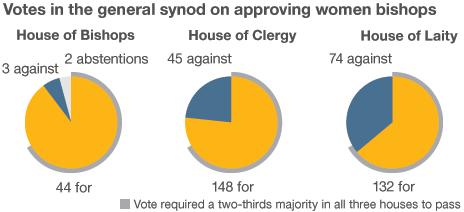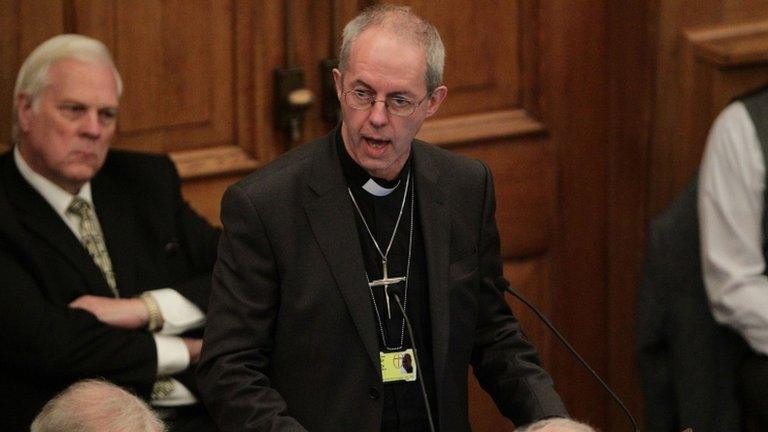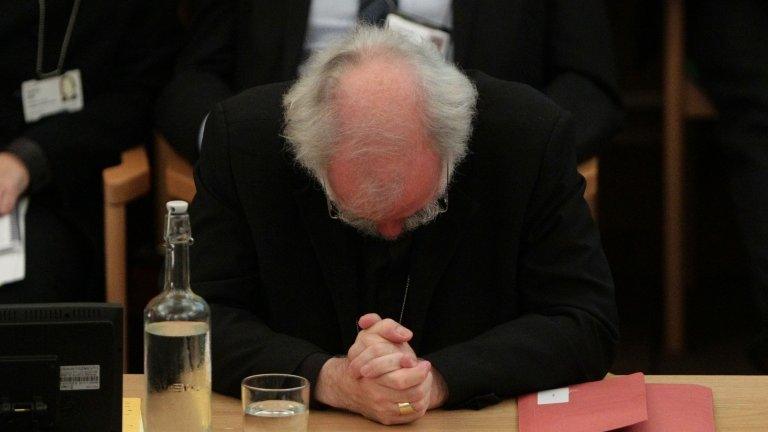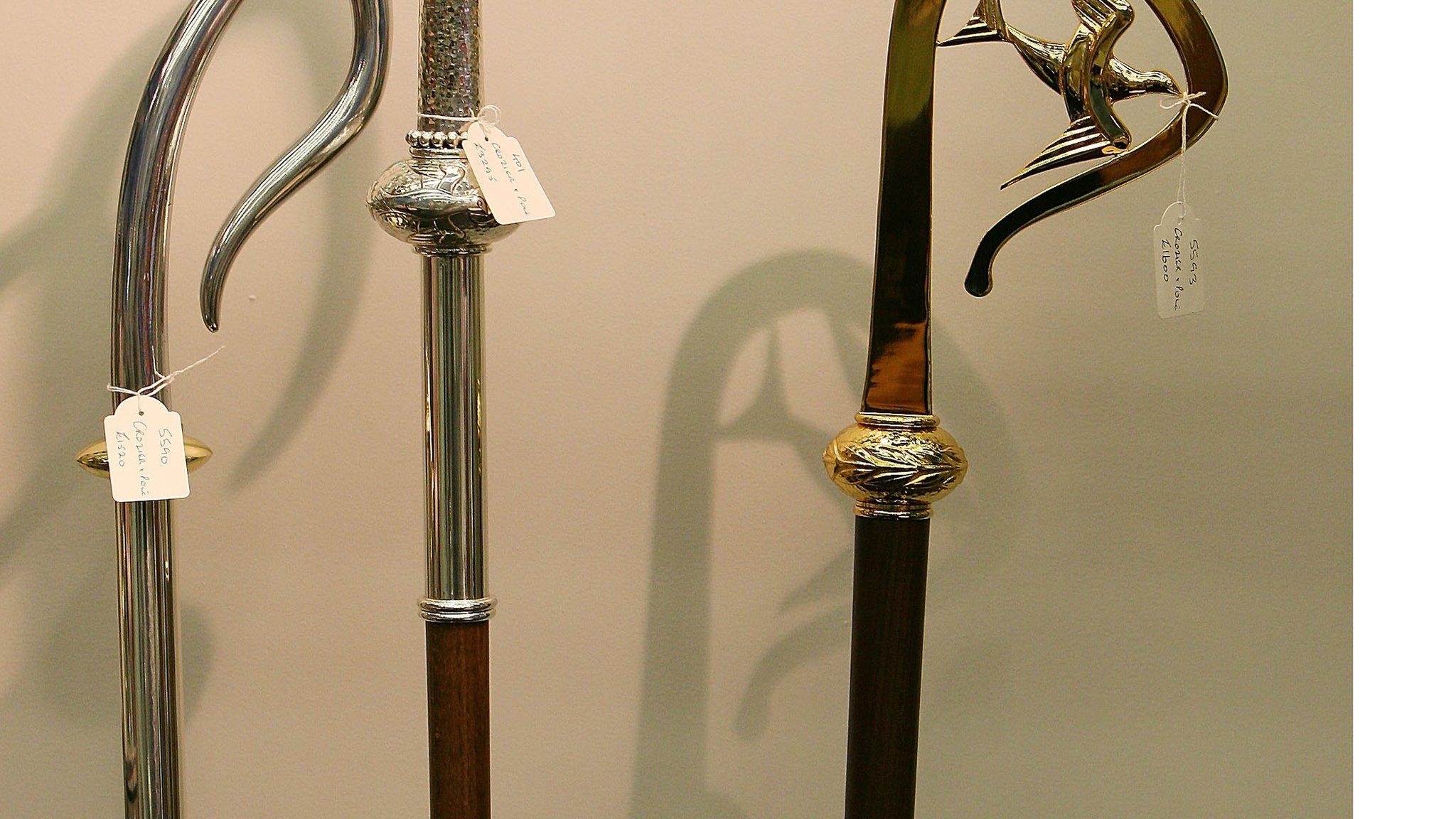Women bishops: Church has 'lost credibility' says Rowan Williams
- Published
- comments
Archbishop Rowan Williams: "It seems we are wilfully blind"
The Church of England has "lost a measure of credibility" after rejecting the introduction of women bishops, the Archbishop of Canterbury has said.
The Most Reverend Rowan Williams told the ruling general synod that the Church could be seen as "wilfully blind" to modern trends and priorities.
While 324 synod members voted for women bishops, Church voting rules mean 122 votes against were enough to block it.
However, the Archbishop of York said the principle had been accepted.
Dr Williams addressed the synod on Wednesday morning, the day after the ruling body had rejected legislation that would have paved the way for women bishops within two years.
He said: "The temptation to run around saying, 'What do we do? Who do we blame?' today is going to be strong. I hope that we will try and hold back from simple recrimination in all this.
"The work to do internally is considerable - but, it's tempting to say, that is as nothing compared with the work we have to do externally. We have, to put it very bluntly, a lot of explaining to do."
John Sentamu: What was rejected yesterday was not women bishops. What was rejected was the legislation.
He went on: "Whatever the motivations for voting yesterday, whatever the theological principle on which people acted and spoke, the fact remains that a great deal of this discussion is not intelligible to our wider society - worse than that, it seems that we are wilfully blind to some of the trends and priorities in that wider society."
A Downing Street spokesman said the prime minister thought there should be women bishops and was disappointed at the result of the vote, but that it was "a matter for the Church to decide".
Unity
The key concerns of opponents within the Church are over provisions for traditionalist parishes opposed to women bishops to request supervision by a stand-in male bishop.
Critics of the legislation said it did not provide enough safeguards for the objectors.
Lay member Alison Ruoff said she had voted against the ordination of women bishops in order to keep the Church together.
"There are hundreds of churches in the Church of England which are standing with us and we were doing what was right for them - it's not just me," she said.
"This is to make sure that we can walk together as one Church of England - a broad Church, yes, but we want to be there without splits, without divisions."
The Rev Prebendary Rod Thomas, chairman of the conservative evangelical grouping Reform, said: "We have avoided what could have been a disastrous mistake for our unity and witness."
But the Archbishop of York, Dr John Sentamu, insisted: "There will be women bishops in my lifetime.
"The principle has already been accepted by the general synod. It has already been accepted by all the dioceses," he told BBC Radio 4's Today programme on Wednesday.
"So what we need to do is find the legislation - 99.9% of the legislation is there - it's this little business of provision for those who are opposed."
Church rules state that the measure cannot be brought back before the synod "in the same form" during the current term, ending in 2015.
But Dr Sentamu said he hoped the Church's "Group of Six" senior officials - the two archbishops and senior clergy and lay representatives - would meet and find a way to revisit the issue before then.
"I believe what was rejected yesterday were not women bishops; what was rejected was the legislation - some people felt it was not good enough," he added.
The proposed legislation paving the way for women bishops needed to gain two-thirds majority support in each of the synod's three houses - bishops, clergy and laity - but fell short by six votes in the House of Laity.

The result was greeted with emotion, with some supporters of women bishops in tears.
The Bishop of Durham, Justin Welby, who is the next Archbishop of Canterbury and a supporter of women bishops, tweeted overnight, external: "Very grim day, most of all for women priests and supporters, need to surround all with prayer & love and co-operate with our healing God."
'Betrayed'
The House of Bishops is meeting on Wednesday morning to "consider the consequences of the vote", the Church's media office said.
The Bishop of Norwich, the Right Reverend Graham James, said those Church members who were in favour of women bishops, but who had voted against the move because of concerns over the provisions for traditionalist parishes, were central to finding a solution.
"There's a very big challenge, I think, to those who voted against but actually pledged themselves to see in what way they could move forward so that women can be bishops in the Church of England," he said.
The House of Laity is the largest element of the general synod and is made up of lay members of the Church elected by its 44 dioceses.
The votes were, external 44 for and three against with two abstentions in the House of Bishops, 148 for and 45 against in the House of Clergy, and 132 for and 74 against in the House of Laity.
Christina Rees, a synod member who has spent 20 years campaigning for women bishops, said: "It feels as if the House of Laity betrayed the entire Church of England last night.
"The people, the sort of extremes in our Church - the very conservative evangelicals and very traditionalist Anglo-Catholics - have no idea how this will be read by most people."
She said she thought that, to most people, "this just looks like blatant discrimination".
Equalities minister Maria Miller said the vote outcome was "very disappointing", and showed that the Church was "behind the times", sources said.
- Published21 November 2012

- Published21 November 2012

- Published16 November 2014
